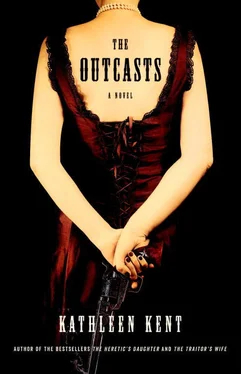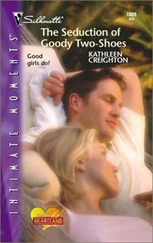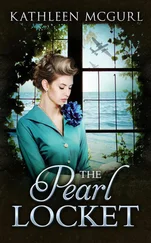She said something in French and Lucinda snapped, “Say what you have to say in English or shut it.”
Tartine tilted her head and smiled. “I said only that Bill told me how pretty is St. Louis.” She uncrossed her legs and sat with her knees wide apart. “He is very felicitous, wouldn’t you say?”
She laughed and Lucinda turned her head towards the window once more. She had tried telling herself that Bill’s sudden attentions to Tartine were to be seen as only his escape from boredom or, at worst, a warning to her against attempting further disobedience. But, in truth, she was ill with anxiety that his restlessness and disapproval would edge her towards another series of weakening fits, rendering her useless to his plans and pushing him to seek another partner.
In every brothel she had ever known, she had always felt herself to be above the other girls, certainly the most poised and intelligent of them. And if not the most beautiful, she presented to her clients the appearance of refined accomplishment. She did not look like a whore, nor did she act like one, and the men who paid for her time felt themselves elevated because of it.
But in New Orleans, her cool detachment was looked upon as an anachronistic and elaborate act that was to be dropped as soon as the customer closed the door. She was not easily shocked, but some of the requests had left her feeling she could crawl out of her own skin.
Soon, soon, she thought. Bill will get what he wants and we can leave this city and its scheming whores, and all of what I do today will be washed away in perfumed baths and fragrant sheets.
The carriage had stopped in front of a large house. Tartine hoisted up the carpetbag, stepped onto the street, and held open the door.
“Well…?” she said impatiently.
“…is a deep, dark hole,” Lucinda whispered, “into which I would gladly push you.”
Lucinda stepped from the carriage and, brushing past Tartine, walked up the stairs and then into the client’s house.
The steamer captain, a gens de couleur named Pascal, invited Nate into his quarters to share an evening meal of battered-and-fried catfish steaks and cornbread. With an amused turn of his lips, he watched Nate eating hungrily and set a bottle of brandy on the table.
“That man you pounded on is going to be eating nothing but apple mash for a while,” the captain said, pouring them each a glass full. “I know you’re Texas law, so what’re you doin’ going to New Orleans?”
“I’m after a man and his accomplice. A prostitute.” Nate tasted the brandy and grimaced. “I made a promise to someone.”
“Family?”
Nate nodded. “Near enough.”
The captain drained his glass and poured another one for himself. “Who’s this man you’re hunting?”
“A killer of children.”
The captain sat back in his chair, motioning for Nate to drink up. “You know your way around New Orleans?”
Nate shook his head. “Never been there before.”
“I was born and raised in New Orleans. I know all the streets and alleyways,” he said. “I’ll draw you a map.”
Nate thanked him and held his breath to take another sip.
“I’ve spent my whole life on the river,” the captain said, warming to his topic. “I’ve seen every rapid and current, snag, sawyer, and mud bank from the Gulf entry to Natchez, nearly four hundred miles away, so I understand bold action. I’ll do what I can to help you.”
He took a piece of brown paper and drew a rough map of New Orleans. “You start here,” the captain said, resting a finger over a few intersecting lines, “at St. Charles and Canal, and go your way to City Hall. There you’ll find the forty thieves. In these few blocks, there are more than forty gambling dens and sporting houses, which stay open all hours. If your man is game, he’ll be there sometime, somewhere.”
He moved his finger above Canal to Basin Street and he smiled. “This, or thereabouts, is where you’ll most likely find your lady.” He traced out a rectangle, moving clockwise from the border streets of Basin to Canal to North Robertson to St. Louis. He pursed his lips meaningfully. “Now, if you’re lookin’ here, I will certainly be happy to help you look.”
Nate frowned and the captain’s smile widened. “You got some money? ’Cause you’re gonna need it.”
Nate looked over at the Whitworth propped in a corner of the steering cabin, thinking he’d sell it if he needed to.
The captain moved his finger towards the snaking outline of the river. “Now, you hear me. You stay away from Gallatin Street. Your man, if he owns a watch and can tell time, will not go there. Even the army stay away from that hellhole.” He folded the map up and handed it to Nate.
Nate tucked the map into his jacket and went back out onto the open deck. He sat on the starboard side under a deck lantern, facing the black water of the Gulf, and began writing to his wife.
Dearest Beth,
I am soon to arrive in New Orleans by the steamer Annie Gillette. You will receive by cable a hundred dollars, a final gift from Dr. Tom, which combined with your widow’s take if I don’t return will hold you in good stead. Please forgive the few words. You have always known best what was in my heart by what I have not spoken, rather than what I have. I do not mean to be careless or take undue risks with my life, but I am determined to see this through as quickly as I am able so that I may return soon to you and Mattie. I think of you most fondly in the field, the sun on your face, the wind braiding your hair, and the smile you will give to me when I am returned to you.
My love always, Nathaniel
The steamer docked in the early morning and Nate stood on the pier waiting for his horse to be led off with the others. The big bay, already saddled and bridled, followed the small herd of horses off the steamer with a lowered head, but at the first shrill release of the boat whistle, he reared, breaking the line, and clattered away from the docks. He raced northwards, up Tchoupitoulas Street, scattering dockworkers and skittering around cargo wagons, his hooves missing traction on the bricked-over streets where they were slick with the mire of refuse and rain.
The steamer captain, standing next to Nate, pointed towards the thoroughfare. “You better go on for him quick before he get to Canal or he gonna be in somebody’s stew.”
Nate thanked him and set off on foot as the captain called after him, “Just be glad he don’t go the other way. Towards St. Thomas. Then he’d be glue!” He laughed once at his own rhyme and Nate waved his thanks over one shoulder, trying to orient himself to the map of the city the captain had given him. Nate looked back once towards the crowded harbor choked with jockeying vessels, the packet boats and steamers skirting one another like pieces in a chess game played at breakneck speed, and he saw that the captain was still watching him, his mouth downturned, worriedly shaking his head.
Nate continued walking northwards as fast as he dared. He passed warehouses and storage shacks, the workers frantically off-loading bags, barrels, crates, and boxes from wagons and handcarts; the men signaling and calling to one another in a language unknown to Nate.
He shouted to a worker, asked if the man had seen a riderless horse racing by, and the man cupped a palm to one ear and said, “Quoi?” Nate repeated the question, and another worker also gestured as though straining to hear and responded the same way. Soon a dozen men were feigning confusion and pointing in different directions, saying, “Quoi?…Quoi?…Quoi?” then laughing uproariously, so that the words, sounding like a chorus of wintering ducks, followed Nate up the street.
Читать дальше












